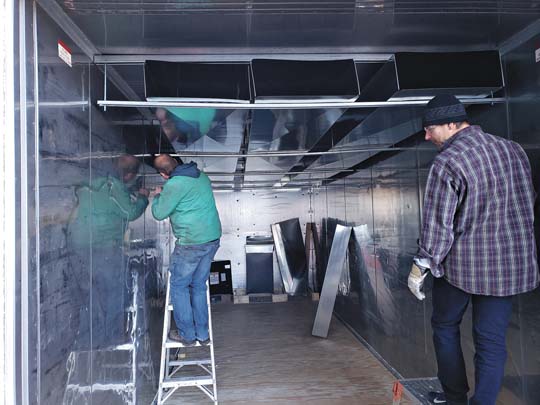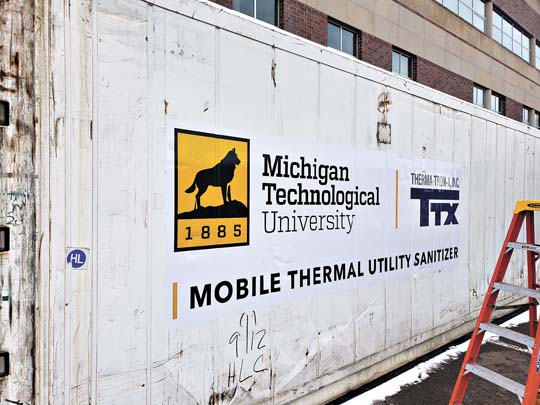Going mobile: MTU builds mobile unit to sanitize PPE
MTU builds mobile unit to sanitize PPE

Photo by Andrew Barnard/Michigan Tech Andrew Barnard works on one of the heating ducts in the MTU sanitizer.
HOUGHTON — A Michigan Technological University engineering team has been testing a method of sterilizing large batches of personal protective equipment that could start pulling up to hospitals around the country.
The Mobile Thermal Unity (MTU) Sanitizer uses a refrigerated shipping container to heat PPE, or larger hospital material up to 170 degrees Fahrenheit. It then holds that temperature for 45 minutes.
It came about through a conversation Great Lakes Research Center Director Andrew Barnard had a couple of weeks ago with his cousin Dan Barnard, who lives in Wisconsin. He runs an organic farm there with his wife Amy, also trained as a biomedical engineer.
“In looking at their refrigerated trucks in the garage, they thought, ‘Why can’t we make those heated trucks that can sanitize PPE?'” said Andrew Barnard, also an associate professor in mechanical engineering at Tech.
And so a 40-foot shipping container was tweaked to run a heating unit. Stainless steel racks are placed inside to hold the PPE. In a two-hour cycle, it can sanitize about 5,000 units.

Photo by Andrew Barnard/Michigan Tech Michigan Tech and Therma-Tron-X, Inc. are building prototypes that use heat to clean personal protective equipment.
Similar methods tested on the H1N1 influenza were able to kill off 99.99% of the virus, according to the Centers for Disease Control.
The portable container could be brought to a hospital or clinic loading dock, where nurses can wheel PPE in and out.
Through $32,800 in seed funding from Tech’s department in Engineering, the team tested a prototype in a parking lot on Tech’s campus with the help of local company Aire Care. It was successful in holding the temperature, Barnard said. For safety reasons, they did not bring samples of coronavirus up to test if the sanitizing works. Instead, the National Guard is bringing it downstate to Taylor.
“We wanted to take the unit to where the virus is,” Barnard said.
That test could be done as soon as this weekend, Barnard said. If the downstate test proves successful, it could hopefully be pressed into service sometime next week, pending FDA approval, Barnard said.
State Rep. Greg Markkanen, R-Hancock, and State Sens. Ed McBroom, R-Vulcan, and Adam Hollier, D-Detroit, are working to get authorization for the device, including with the governor and attorney general’s office. For federal approval, they are working through U.S. Rep. Jack Bergman’s office, Markkanen said.
“It’s still very, very preliminary, but we expect it to move pretty fast when we get everything in a row here,” he said.
The project shows how to combine local resources and find creative solutions to combat a crisis, Markkanen said.
“The engineers and graduate students at Michigan Tech are just phenomenal,” he said. “…It could be a gamechanger for being able to reuse PPE. That’s important. We want to keep our health care workers protected.”
Several hospital systems have already shown interest in using it, Barnard said. He is also working with manufacturing partners around the country for other areas.
The parts are all commercially available, meaning the design can be replicated anywhere, Barnard said.
“If you need it in New York, you can build it there,” he said. “You don’t need doctors to build it. It can be built by residential contractors, essentially.”
It’s a testament to what can be done through collaboration, Barnard said: the state, the National Guard, several Tech departments and several industrial partners, including Aire Care and Thermo-Tron-X, a Wisconsin industrial company that helped with the heating system.
“I think it’s a really great example of what can be done in a short amount of time with everyone keeping an open mind and collaborating,” he said.






